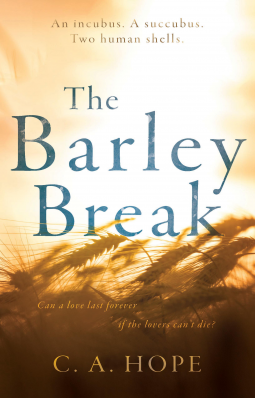
The Barley Break
by C. A. Hope
This title was previously available on NetGalley and is now archived.
Send NetGalley books directly to your Kindle or Kindle app
1
To read on a Kindle or Kindle app, please add kindle@netgalley.com as an approved email address to receive files in your Amazon account. Click here for step-by-step instructions.
2
Also find your Kindle email address within your Amazon account, and enter it here.
Pub Date 2 Feb 2019 | Archive Date 8 Mar 2019
Troubador Publishing Limited | Matador
Talking about this book? Use #TheBarleyBreak #NetGalley. More hashtag tips!
Description
An incubus. A succubus. Two human shells. Can a love last forever if the lovers can’t die?
Jennifer Roseberry is visiting her mother, who has been admitted into hospital. With her is Sara, her twelve year old daughter. The woman in the next bed, a well known historian, is terminally ill. She talks briefly to Sara, and then before visiting time is over, she dies peacefully.
From that moment onward, Jennifer notices striking changes in her daughter. She is no longer painfully shy and awkward. Jennifer and her husband are educated, professional people; yet Sara suddenly knows things they have never heard of, far beyond the capacity of a twelve year old girl.
Sara becomes friends with a girl called Tracy, and through eavesdropping, Jennifer learns both her daughter and Tracy are, in fact, succubae. Or, at least, they are possessed by such beings. With her suspicions growing, Jennifer uses a digital voice recorder to find out more about the spirit inhabiting her daughter. Desperate to bring their daughter back, through a series of conversations she is transported back to the War of the Roses, and what she learns about the past could change everything...
The Barley Break is an enticingly gripping romance novel with a historical, paranormal twist from debut author C. A. Hope.
A Note From the Publisher
C. A. Hope was born in the North East of England and is a volunteer fundraiser for GNAAS. She was also an ex-theatre sister for many years before writing The Barley Break, which is her debut book.
Available Editions
| EDITION | Ebook |
| ISBN | 9781789019568 |
| PRICE | $5.99 (USD) |
| PAGES | 200 |
Average rating from 6 members
Featured Reviews
 Kathryn G, Educator
Kathryn G, Educator
It has been a few weeks since I finished reading The Barley Break. I wanted to wait because I was not sure how I felt about the story. Isn't that the mark of a unique book? It made me think. It had me thinking about the nature of good and evil weeks after I finished reading.
The Barley Break is about a succubus, a human entity that does not die. When the body dies, the spirit can move to another body and continue living. Maude, the succubus in the story, is centuries old and now inhabiting the body of Sara. Mom Jennifer realizes that something is different about her daughter. Finding out about Maude raises concerns and questions for Sara's parents. Is this still Sara? Reading about the different lives Maude lived throughout history was interesting. Maude lived as a good person in the different bodies she used. But she did use the bodies of other people. The spirits of those other people, their personalities and uniqueness, are subsumed by the succubus. The body becomes a shell with talents and abilities used by the succubus. Is this good or evil? Even if the succubus uses for good purposes the body of another soul, is that justification? Is it evil? I have come to my own conclusions. Thanks, C.A. Hope, for making me think.
 Reviewer 533508
Reviewer 533508
A compelling start and an exciting finish, but the middle was a little slow and slushy. This story read more like a romance novel...not what I was initially led to expect.
Thanks to Troubador Publishing and NetGalley for the opportunity to read and review this book.



